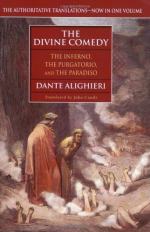|
This section contains 617 words (approx. 2 pages at 400 words per page) |

|
circa 1300: Dante's understanding of the universe, knowledge of which is key to understanding his work, was based upon the ideas of the Greek astronomer, mathematician and geographer, Claudius Ptolemy (circa B.C. 100-circa 178). Ptolemy asserted that the stars and planets were embedded in crystalline spheres that revolved around the earth. This geocentric (earth-centered) belief placed earth and humanity at the center of all creation, in the location of greatest importance.
Late twentieth century: In 1543 the Polish scholar, Nicolaus Copernicus (1473-1543), published his theory that replaced Ptolemy's. Copernicus argued that the earth is not the center of the universe, but that it and all the planets in our solar system revolve around the sun. This heliocentric (sun-centered) system changed classical and medieval notions of humanity's importance in the grand scheme of creation and became the foundation of modern astronomy.
circa 1300: Dante believed that the southern...
|
This section contains 617 words (approx. 2 pages at 400 words per page) |

|




